
Remember Thrive Alliance on Giving Tuesday

Staying Healthy This Winter

Tips for Beating Holiday Blues


Wellness Wednesday – November 25

Caregiver Grief Comes in Many Forms
Caregiver Grief Comes in Many Forms
Whether your loved one is living in their own home, or a long-term care facility, the pandemic has probably changed how and when you interact with them, and you have probably questioned if visiting – and hugging them – is safe for either of you. If you live in another state, you may not be able to travel to see them as frequently or safely as you did before the pandemic. You may even start to feel like you are no longer their caregiver.
Being a family caregiver means not only taking up new duties, it also means taking on a new identity. This role often takes precedence over other relationships – and during the pandemic, if we can no longer be with the person we are caring for, we are left for a time on a threshold between these roles, not fitting into old patterns and not ready for new activities. No matter how much we do as caregivers, it takes effort to feel we did enough, especially when we are trying to balance our complex roles. When we can no longer be with our care recipient, it can leave us feeling sad and with a sense that we’re not being good caregivers. Many are left with a sense of unfinished business, have feelings that were not expressed, or are denied forgiveness that was not asked.
Caregiver grief is a lonely business. With conditions such as dementia, it usually begins long before your loved one’s death. Depressive feelings of sadness and emptiness, anger, and guilt, are common – and isolating. The challenge lies in looking at our grief as a companion rather than an enemy, a reminder of the preciousness of the relationship. Self-care is critical to managing this grief. When we have no one else to care for but ourselves, it can be difficult to re-establish routines. The discipline of physical exercise, of good nutrition and diet, can begin to take up those spaces that caregiving used to fill, and lay the foundation for what is to come. Caring for oneself with time and patience also helps relieve depression and anxiety, and helps you move beyond loneliness.
Finding new routines during an ever-changing set of restrictions can be especially challenging. If your loved one is living in a long-term care facility, stay in touch with the facility staff. Visitation policies can change at a moment’s notice. And if your loved one lives far away, consider different ways to travel and see them. Renting a small RV and living in it while you visit would be one way of maintaining isolation and avoiding exposure to hotels and airports. And sadly, if your loved one is experiencing a health crisis or is approaching end of life, you may want to re-evaluate your approach. Sometimes, the danger of exposure to COVID can feel less important than saying good-bye in person.
After a time, you will be able to look back and discover many gifts in the caregiving journey you undertook, knowing that you gave so much love and good care under the most trying of circumstances. Eventually, we will all move back into life in a new way, wiser and more patient, with a renewed sense of tenacity and appreciation for the human touch.
Adapted from CAN’s signature series Life After Loss
Caregivers can call Thrive Alliance at 812-372-6918 to get connected to local resources.
Watch this space next Monday for Ten Tips for Family Caregivers. Caregiving is tough. There’s no doubt about it. That’s why this month is dedicated to highlighting the various ways caregivers can meet the challenges of caregiving during the pandemic to help themselves and their loved ones.
Wellness Wednesday November 18

Virtual Senior Cafe: Name that Tune HOLIDAY EDITION

Thrive Alliance Housing Partnerships Has Availabilities

Caregiving and Telehealth in the World of Coronavirus

What is a video appointment? Is it the same as telehealth? Is this even a real doctor’s visit? Is it covered by insurance? What if my loved one doesn’t have a smart phone or a computer?
These are only a few of the many questions surrounding the use of telehealth during the pandemic. In addition to everything else they do to take care of their loved ones, family caregivers now have to be the Geek Squad tech experts for video visits.
Many clinicians have adapted to using video visits better than they thought they would, with some reporting that they are engaging caregivers and family members in new ways. And while we all may miss in-person visits, for some, telehealth is easier and safer than in-person visits and are highly effective at reducing the risk of infection.
As one doctor put it: “I did not think I would like telehealth, but I love it. I have met family members, engaged family in treatment, and even gotten a tour of a patient’s new apartment. It’s really shifted the relationship to be less hierarchical and more inclusive of those with disabilities or other barriers to care.”
From a caregiver’s perspective, while virtual visits are great, there is still some room for improvement. Some of the video conferencing platforms or health system policies do not allow a caregiver to join a visit from a third location. Pre-COVID-19, caregivers who drove a loved one to the doctor’s office would have been in the room during the appointment, serving as another set of eyes and ears. Caregivers help report symptoms, express concerns and ask questions. Without their caregiver’s present, some patients may be left confused, or unable to manage their own care.
Family caregivers need to be able to engage in a virtual visit the same way they would if they were in the exam room with their loved one, and health insurance, including Medicare and Medicaid, needs to continue to pay for virtual visits and to allow family caregivers to connect to virtual visits from a third location if necessary.
The current, temporary waiver that allows Medicare to pay for telehealth for all enrollees should be made permanent. As policymakers consider extending and further expanding telemedicine capabilities, they should consider the role of caregivers. Caregivers are vital to ensuring adherence to their loved one’s care plan.
_____________________________________________________________________________
John A. Schall, M.P.P. (Chief Executive Officer, Caregiver Action Network)
Caregivers can call Thrive Alliance at 812-372-6918 to get connected to local resources.
Watch this space next Monday for information on another caregiving challenge: When Caregiving, Coronavirus, and Finances Collide: millions of family caregivers are currently experiencing some sort of financial hardship related to unemployment due to the pandemic.
Wellness Program Survey

Help us create Wellness Programs to meet the needs of our community. If you are 60 years of age or older or disabled, please complete our Wellness Program Survey at this link: https://www.surveymonkey.com/r/6JQKMFK

